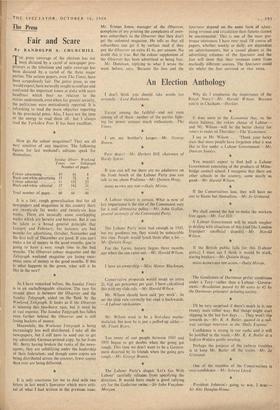The Press
Fair and Scare
By RANDOLPH S. CHURCHILL
THE press coverage of the election has not been dictated by a cartel of newspaper pro- prietors as the television and radio coverage has been dictated by a cartel of the three major parties. The serious papers, even The Times, have been scrupulously fair. The gutter press, as one would expect, have naturally sought to confuse and confound the important issues at stake with scare headlines which bear no relation to the stories underneath, even when, for greater security, the politicians were meticulously reported. It is refreshing to read the more objective reporting in the provincial press. Alas, I have not the time or the energy to read them all : but I always read the Yorkshire Post. It has been excellent.
How go the colour magazines? They are all very sensitive of any inquiries. The following figures for last weekend's editions speak for themselves: Sunday Obser- Weekend Times ver Telegraph
Number of pages' Colour advertising 19 6+ 8 Black-and-white advertising 13
6 Colour editorial II 15+ 23 Black-and-white editorial . 17 143 11 Total number of pages .. 60 44 48
It is a fair, rough generalisation that for all newspapers and magazines in this country there are twenty-six fat weeks and twenty-six lean weeks. There are naturally some overlapping Weeks which are betwixt and between. But it can be taken as a broad general principle that January and February, for instance, are bad months for advertising, October, November and the first half of December are good. If you Can't make a lot of money in the good months, you're going to have a very rough time in . the bad months. The Observer colour magazine and the Telegraph weekend magazine are losing enor- mous sums of money in the good months. If this is what happens in the green, what will it be like in the sere?
As I have remarked before, the Sunday Times is in an unchallengeable situation. The race for second place is between the Observer and the Sunday Telegraph, aided on the flank by the Weekend Telegraph. It looks as if the Observer is winning this two-horse race, but it must be at vast expense. The Sunday Telegraph has fallen even further behind the Observer and is still losing buckets of money.
Meanwhile, the Weekend Telegraph is being increasingly less welt distributed. I take all the newspapers, but I still have to send out to get my admirably German-printed copy. So far from Mr. Berry having broken the ranks of the news- agents, they are solidifying under the leadership of their federation; and though some copies are being distributed across the counter, fewer copies than ever are being delivered.
It is only courteous for me to deal with two letters in last week's Spectator which were criti- cal of what I had written in the previous issue. Mr. Tristan Jones, manager of the Observer. complains of my printing the complaints of over- seas subscribers to the Observer that they don't get the coloured magazine. He tells us that all subscribers can get it by surface mail if they pay the Observer an extra El 6s. per annum. No doubt this is true. But the colour supplement of the Observer has been advertised as being free.
Mr. Donovan, replying to what I wrote the week before, says, 'Because the Sun and the Spectator depend on the same facts of adver- tising revenue and circulation their futures cannot be unconnected.' This is one of the most gro- tesque utterances I have ever read. Of course all papers, whether weekly or daily, are dependent on advertisements, but a casual glance at the advertising columns of the Spectator and the Sun will show that their revenues come from markedly different sources. The Spectator could die whilst the Sun survived or vice versa.


































 Previous page
Previous page